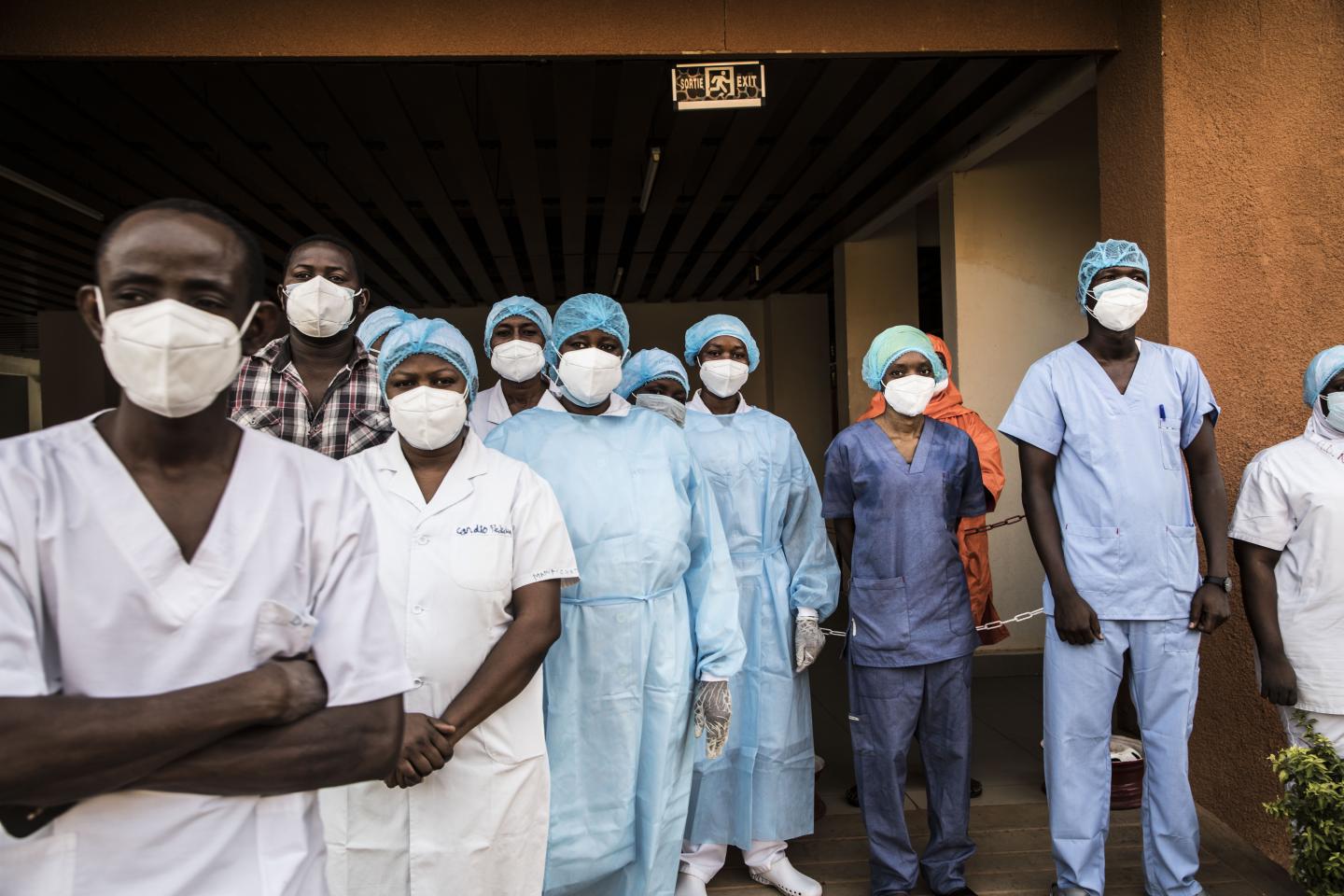Health
Negligence in hospitals and quest for patients’ safety

In every profession the practitioners are bound to make mistakes. A tailor, out of negligence, may make a mistake while cutting materials same as a plumber while fixing the pipes.
However, while some mistakes and negligence in some professions can be tolerated, in other professions, it could be fatal and irredeemable.
In this category are medical and health workers.
Negligence on their part can lead to devastating consequences for patients and their loved ones.Medical negligence, according to the Free Dictionary, is the improper, unskilled, or negligent treatment of a patient by a physician, dentist, nurse, pharmacist or other health care professional.
It underscores the critical need for healthcare providers to prioritise patient safety, maintain stringent standards of care, and foster a culture of accountability.
Patient safety refers to efforts and measures taken to ensure the safety, well-being, and quality of healthcare services provided to patients.
It encompasses various aspects such as preventing medical errors, reducing harm, improving communication, promoting patient empowerment, and establishing a culture of patient safety within healthcare facilities.
On the occasion of World Patient Safety Day, with the theme: “Engaging patients for patient safety”. The theme was selected in recognition of the crucial role patients, families and caregivers play in the safety of health care.
Ms Nkechi Akande, 39, is a school teacher wen to hospital for a surgical procedure, unaware of the challenges that awaited her.
Akande alleged that due to negligence, her condition took a turn for the worse, plunging her into a nightmare she never anticipated.
“During my hospital stay, my vital signs were not adequately monitored, medications were administered incorrectly, and post-operation care was inadequate.
“As a result, my health rapidly deteriorated, and I experienced severe complications. What should have been a straightforward procedure turned into a journey of pain, multiple corrective surgeries, and an arduous recovery process,” she narrated.
She said that the impact of this went beyond the physical realm, affecting her mental and emotional well-being.
“Anxiety, depression, and a loss of trust in the healthcare system became her constant companions. However, I decided to transform my harrowing experience into a catalyst for change.
“Driven by a desire to prevent others from enduring a similar ordeal, I became an advocate for patient safety,” said Akende who is now a health care safety advocate.
She has been sharing her story, raising awareness about the importance of proper hospital protocols, staff training, and patient empowerment.
“Collaborating with patient safety organisations, I have dedicated myself to ensuring that hospitals prioritize patient well-being and implement robust measures to prevent future incidents,” she said.
Akande’s story serves as a poignant reminder of the devastating impact hospital negligence can have on Nigerians and their families.
Although she has been vocal about her experience, hers is almost a common development in many hospitals nationwide most of which have gone unnoticed.
According to experts, the emerging concern of patient safety in the country has been described due to its large population.
This calls for effective patient safety policies and infrastructure to address quality issues in healthcare.
While patient safety received attention during the COVID-19 pandemic, particularly in areas such as sanitation and infection control this focus has declined and COVID-19 threat diminishes.
Although some patients or their loved ones have gone to the court to seek redress when they think their safety has been compromised, most others just move on with their lives.
However, legal experts say the Nigeria’s laws also protect the rights of patients to safety.
Dr Henry Okeke, Lecturer, International Law &Jurisprudence Department, Faculty of Law, Nnamdi Azikiwe University, said Nigeria is a common law country which has been adopted common law principles in its medico-legal considerations.
“It is true that there exist health regulatory framework and that such regulatory services can be extended to the administration of Patient safety related matters?
“Of course, any health law that promotes the wellbeing of the patient is considered as promoting patient safety, except that it may not optimally regulate liabilities arising out of patient safety-related offences and matters,” he explained.
Okeke, therefore, urged Nigerian legislators pass more laws that would strengthen the safety patients and overall quality of health care delivery in the country.
Ducit Blue Solutions, an organisation which seeks to enhance quality service delivery and patient safety in Nigeria, said that patient safety was essential for the quality and effectiveness of healthcare services.
The Foundation said that to ensure safe healthcare practices in the country, the government and other key health players should establish a Patient Safety Programme Board that oversees the strategic delivery of education.
“They should also provide adequate and high-quality educational resources and train staff to practise safely,” it said in a report.
But government says it is taking steps to address the challenges.
Dr Shetak Gilbert, Head of Patient Safety/Oxygen, Federal Ministry of Health (FMOH), said that Nigeria has developed the first ever National Policy and Implementation Strategy on Patient Safety and care quality.
Gilbert said the policy is in line with the Resolution 18 of the 55th World Health Assembly (WHA 55.18) which called for member states to recognise the burden of patient safety and to set up policies to manage them.
“The National Patient Safety and Care Quality policy focuses on improving different aspects of patient safety including family engagement in health care, medication safety, surgical safety, infection prevention and control (IPC) etc. etc.
“The document aligned with the FMOH four-point agenda: improving quality of health governance in Nigeria and improving population health outcomes.
It is also in line with medical industrialisation-the value chain of the health sector; and improving health security- preparatory response to public health threats,” he explained.
According to the Chairman National Advocates for Health (NA4H), Mohammed Usman, the Nigerian healthcare system recognise the importance of patient safety and has made efforts to address this issue.
“The Federal Ministry of Health and Social Welfare, in collaboration with other stakeholders, has developed policies and guidelines to improve patient safety standards and practices in the country,” he said.
Usman said it was important to note that while efforts were being made to improve patient safety in the country there was still plenty of work to be done.
“Challenges such as limited resources, inadequate infrastructure, and systemic issues can hinder progress.
“However, with ongoing commitment, collaboration, and implementation of evidence-based practices, Nigerian patient safety can continue to improve, ensuring better healthcare outcomes for all patients,” he explained.
Health
We want Nigeria Where No Child Is Exploited, Excluded – Children’s Parliament

National Children’s Parliament has urged stakeholders to build a Nigeria where no child faces violence, forced labour or exclusion.
The Speaker of the parliament, Progress Umoh, made the call at the 2025 National Children’s Day in Abuja on Tuesday.
Umoh said that children craved for a country where every child has the tool to learn, dream and grow to full potential.
She pointed out that many children face violence, fear and exclusion in spaces meant to nurture them, adding that children demand more than promises.
“We demand protection. As Nelson Mandela said — a society’s soul is measured by how it treats its children.
“Let us honour that truth with action.
“As the speaker of the National Children’s Parliament, I stand before you not just as a young Nigerian but as a voice for millions of children whose rights and future depend on meaningful action.”
She said that the Children’s Parliament serves as vital platform where young voices unite to address critical issues, propose solutions and drive change.
According to her, children deserve a seat at the table in shaping policies that affect them.
She noted that the theme of the global observance — “Stand Up, Speak Up: Building a Bullying-Free Generation”, is an urgent call to action.
She, therefore, called for full implementation of the National Policy on Safe Schools to ensure every child learns in a safe environment without fear.
The speaker also stressed the need to strengthen child rights advocacy clubs in rural and underserved areas.
This, according to her, will empower young leaders to speak up.
She explained that “while initiatives like the National Commission for Almajiri Education are commendable, we need bolder steps to rescue out-of-school children, providing them education, safety and skills for the future.
“Programmes like the Girl-Led Movement proves that when children lead, change happens, such
initiatives must include all children, ensuring their voices shape decisions about their lives.”
Responding, President Bola Tinubu reaffirmed his administration’s commitment to protecting the rights, dreams and future of every Nigerian child.
Represented by the Minister of the Federal Capital Territory, Mr Nyesom Wike, the president described children as “the precious part of the nation’s fabric.”
Wike was also represented at the event by the FCT Minister of State, Dr Mariya Mahmoud.
Tinubu added that children are also the heartbeat of Nigeria’s future and custodians of tomorrow’s promise, innovation and leadership.
He said “I, therefore, reaffirm today, our constitutional, moral and intergenerational duty and commitment to safeguard every Nigerian child, protect their rights and nurture their dreams.”
Similarly, the Minister of Women Affairs, Imaan Sulaiman-Ibrahim, said children’s day serves as an opportunity to reaffirm commitment to uphold the rights of every child to survive, thrive and fulfil their potential.
Sulaiman-Ibrahim added that the day also presents an opportunity to reflect and renew commitment to the rights, protection and wellbeing of every Nigerian child.
She said the Federal Government would strengthen the Nigeria Children’s Parliament to institutionalise child participation in governance.
“We are also developing the institutional framework for a National Child Protection and Development Agency.
“This strategic action aligned with the ministry’s Five-Year Strategic Roadmap to ensure accountability, coordination and sustainability in child welfare programming.”
On her part, Dr Adedayo Benjamins-Laniyi, the Pioneer Mandate Secretary, FCT Women Affairs, said “we are here to recognise the significance of our children in the family circle and the society at large.
“Importantly, we are here to stress the obvious fact that our children are great asset to us, they represent our hope, our continuity, our vision and most importantly, the future of our dear country, Nigeria.
“Today, as we gather to celebrate our children, we call on our teeming students in FCT to rise against bullying and speak up whenever confronted with this radical menace.
“I urge you to avoid bullying and channel all your energy to academic resourcefulness to shape a better tomorrow for yourselves,”(NAN)
Health
Menstrual Health Day: AHF Nigeria Wants Joint Action to End Period Poverty

The AIDS Healthcare Foundation (AHF) Nigeria, has called for joint actions to ending period poverty in Nigeria with consistent investment in initiatives that bridged the knowledge gap of menstrual health management.
The AHF Nigeria Country Programme Director, Dr. Echey Ijezie, made the call on Monday in a statement in Lokoja.
The Menstrual Health Day is observed annually on May 28.
The 2025 Menstrual Health Day has as its theme ”Let’s Fight Period Poverty and End the Stigma”.
Ijezie said that research showed that nearly 2 billion people menstruate globally, with 500 million experiencing period poverty, including the lack of access to menstrual health products, safe and clean facilities, and accepting communities.
“We are calling on government to invest in providing free sanitary pads to young girls, across Nigeria, especially indigent girls who lack access to sanitary pads,” he said.
He emphasised the need for collective actions to address the stigma, cultural taboos, and lack of menstrual hygiene access that undermine dignity and increase HIV risk among women and girls.
He said that as part of activities to commemorate the World Menstrual Health Day 2025, the AHF Nigeria would carry out a commemorative event at WAPI Secondary School Calabar, Cross River as well as in the Karinmajigi community in Abuja.
The country pragramme director noted that women and girls globally, particularly in regions like sub-Saharan Africa, were faced with a disproportionate HIV burden.
He stressed that lack of access to sanitary pads had forced many to miss school, thereby increasing the likelihood of dropping out.
This, he said often resulted to increased transactional or transgenerational sex, limiting their ability to negotiate safer sex thereby raising the risk of contracting HIV.
He explained that the AHF’s menstrual health day worldwide commemorations were part of broader strategic prevention efforts that highlight the link between menstrual health and HIV.
He added that it would promote the availability and accessibility of menstrual products, and integrate sexual and reproductive health information and services.
According to him, it will ensure that women, girls, and people who menstruate have access to sanitary pads, HIV testing, condoms, and essential care.
He disclosed that the AHF Nigeria would empower young women and girls, both in-school and out-of-school with the information and knowledge they require for a safe menstrual experience.
“Importantly, we shall provide free sanitary pads, both disposable and reusable to young girls in Calabar, Abuja and Makurdi.
“AHF is committed to ending period poverty in Nigeria with consistent investment in initiatives that bridges the knowledge gap of menstrual health management.
“We will bridge the knowledge gap in young women and girls and in combating the myths, stigma and cultural taboos undermining the wellbeing of young women and girls.
“To this end, we will continue to expand access to accurate information and the provision of free sanitary pads to compliment the efforts of other concerned stakeholders,” Ijezie said.
He noted that barriers, along with stigma, could lead to poor health outcomes, missing school or work, and adverse effects on mental health.
NAN reports that AHF, the largest global AIDS organisation, currently provides medical care and services to more than 2.2 million people in 48 countries worldwide. (NAN)
Health
Children’s Day: Prioritize Girl-Child’s Needs — NGO

A non-governmental organisation — Mothers And Marginalized Advocacy Centre (MAMA) — has urged governments, civil society groups, and the public to unite in prioritizing the needs of children, especially the girl-child.
The Executive Director of the organisation, Ms Chioma Kanu, made the call in a statement on Sunday ahead of the International Children’s Day on May 27.
Kanu said that a country, such as Nigeria, where every girl could grow up safe, educated, and free from exploitation could be achievable through collective action.
She said that the organisation was founded and led by survivors of domestic violence, including women and girls.
She said, therefore, the survivors were raising a powerful voice to highlight the critical and often overlooked needs of girls and vulnerable groups across Nigeria.
“Drawing upon lived experiences, we urge increased awareness, targeted interventions, and stronger protective measures to safeguard this vulnerable population, ” Kanu said.
According to her, Nigeria continues to grapple with complex socio-economic challenges that disproportionately impact girls and women.
This, she said, left them at heightened risk of exploitation, violence, and trafficking.
“As survivors, we understand the insidious ways in which vulnerability can be exploited.
“International Children’s Day should be a time of celebration and hope, but for countless girls in Nigeria, it is a reminder of the dangers they face daily.
“We cannot stand idly by while their futures are stolen, “ Kanu said.
The founder also called for attention to several key areas requiring urgent action such as education and empowerment programmes.
Kanu said: “We believe that ensuring access to quality education for all girls is paramount in preventing exploitation.
“Empowering women through skills development and economic opportunities reduces their vulnerability to traffickers and abusive situations.
“We advocate for increased investment in girls’ education, scholarships for marginalised communities, and programmes that promote financial independence for women.”
The founder also called for an end to Gender-Based Violence in Nigeria.
According to her, the prevalence of gender-based violence, including sexual assault and harmful traditional practices, creates a climate of fear and insecurity that traffickers exploit.
“MAMA Centre therefore calls for the strict enforcement of laws protecting women and girls, the provision of comprehensive support services for survivors of violence, and community-based initiatives that challenge harmful norms,” she said.(NAN)




















